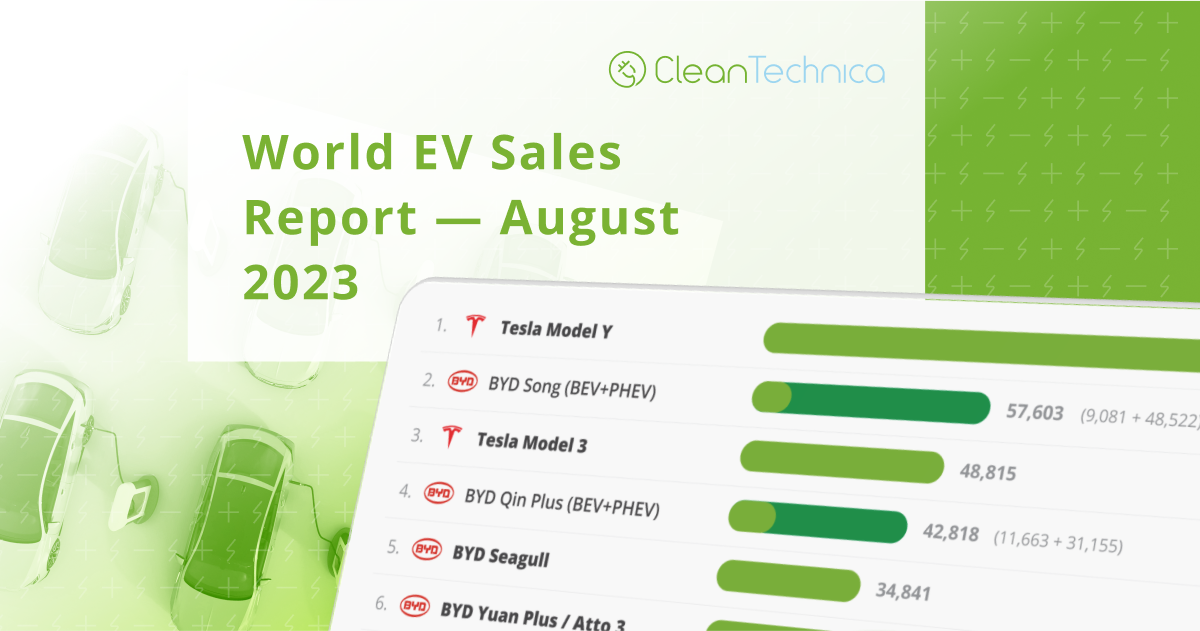- cross-posted to:
- evs@lemmy.world
- world@lemmy.world
- cross-posted to:
- evs@lemmy.world
- world@lemmy.world
I wonder when this is going to seriously affect world oil demand? People used to think “Peak Oil” would be when supply was constrained, it turns out it will be when demand is constrained.
It will change when electric cars cost the same as a regular car. The cheapest EV in France is 3 times more expensive than my car. I can’t afford it.
I know my Chevy Bolt had a higher sticker price than other subcompacts but the TCO is way lower than anything else on the market thanks to way lower maintenance and operating costs.
Not to mention the $7500 tax credit and if you’re in CA there’s also a tax rebate (they send you a check).
Je suis curieux, tu parles de quelles voitures là ?
The cheapest Dacia or Skoda (according to the internet) costs 20 000 €. My car cost 7000 €. I don’t care about TCO if I can’t afford it to begin with.
It gives me 13 000 € of fuel for free, which is more than 10 years, the lifespan of the car.
As for the maintenance, my car costs 50 € per month at most which is reasonable. And even if the bank accepted a credit with a disgusting rate, I don’t have electric plugs around me, so…
The cheapest ICE Dacia is 12000€. I suspect you are comparing a new car price vs a used car price, which is quite unfair.
You can get a used Dacia or a used Zoe for a bit under 10000€, which has probably less km than your car (see this one https://zoomcar.fr/dacia-spring-business-2020-33479218.html, or the numerous Zoe). Now granted these are not great cars: but it is hard to compare a 5-10 year-old ICE with an electric, simply because the electric used market is still small as these cars are new.
Now you raise a valid point on the chargers. But this is coming and that’s why no one (almost no one, I’m sure there are lunatics somewhere) wants to ban ICE right away. You ban new ones in 7 years, and this means that in 17 years a good majority of the cars will be electric. Chargers are quite quick to install, especially low power ones. There are many companies focusing on street light charging and as the number of electric cars grow, public chargers will become more available with a denser network. It’s really a chicken and egg problem - they won’t install massive amounts of chargers for them to stay unused.
10 000 € for a new car, not a used one. Anyway, why would I buy an EV that I can’t charge?
The weekly articles about EVs are annoying if you can’t buy or use one.
Last but not least, why is your cheapest car a SUV? I want a small car, not a tank like that.
Edit: I saw that they sell cheaper EV for 7000 € but with 120 km of autonomy. I suspect that these are the first EVs on the market because it’s not usable.
Lol, wouldn’t 120km be a weeks worth of driving if you only spend 25 euros on petrol per week on average?
You seem to be looking at reasons why they wouldnt work for you and keep changing your rationale when shown to be wrong.
That tells me you’ve made your mind up on electric vehicles, not based on facts, but on emotion. Be prepared to get left behind. Your ice vehicle will cost more over time as there is less parts, less mechanics and the fuel cost continues to rise.
Those numbers do not reflect any kind of reality and feels like science fiction to me. 120 km is dangerous if you don’t have access to a charger. And 25 € per week? Tell me where I can find this cheap oil.
I’m looking at reasons to change, and so far, I just can’t physically and financially get an EV.
Once they sell a cheap and small EV with a real battery, I will change.
cost more over time
I wish hipsters understood that there is no “over time” for poor people.
deleted by creator
“I’m only going to help save the world if it does not inconvenience or cost me anything whatsoever at all” is not the brilliant take you think it is.
Based on this data, 48.6% of oil was used on the read. If we assume that about every other car becomes electric, that could cut the total oil demand by about 24%. That’s actually quite significant, but obviously it will happen so gradually that the oil industry should have enough time to adjust.
Eventually most cars will be electric, but even that won’t destroy the entire oil industry, because there are still many other uses for oil. It takes a while for various other industries to shift away from burning oil and gas, but when that happens the oil industry will be totally screwed.
It takes a while for various other industries to shift away from burning oil and gas, but when that happens the oil industry will be totally screwed.
I’m not so sure that they’d be necessarily screwed even then, I think it will depend upon what direction plastic demand and plastic production goes in. The majority of plastics still need to be made from petrochemicals, and the majority of plastics have to be virgin simply due to the inherent limitations on their recyclability.
Sure, the industry won’t be as large as today but unless we see bioplastics completely replace petrochemical plastics or simply see plastics completely abandoned (that’ll never happen, plastics are simply too useful to ditch entirely.) It will still exist in some form simply because it will be necessary for plastic production.
The oil industry isn’t about to go anywhere, that’s for sure. It’s just that within the next 100 years, it will probably shrink to a tiny fraction of what it is today.
Now that plastic bags or straws have been banned in certain parts of the world, the future of plastic is beginning to look slightly more uncertain than it used to, but I wouldn’t be too worried just yet. Microplastics are also lookin pretty concerning, so maybe in the very long run we’ll start addressing that as well. All of this might reduce the demand for plastic in general, but I don’t think that’s going to have a major impact any time soon. As you pointed out, plastics are too versatile to ditch entirely.
Maybe we’ll start using more bioplastics, but petrochemical based plastics will be used in many places regardless. At the moment, plastics are used pretty much everywhere, even when it clearly isn’t the most optimal solution. I think that this situation will begin to gradually change as the production and use of alternatives become economically attractive.
For instance, a plastic wrapping around a salad doesn’t need to last thousands of years. As long as it protects the salad all the way from the farm to my kitchen, It’s good enough. This sort of optimization will probably reduce the demand for plastic, but it will probably never go down to zero. There are lots of applications such as chemical bottles where long term durability is far more important.
The shitty thing is that as it puts the pressure on big oil, prices will rise and hurt poor people the hardest. We’re already being squeezed by the cost of gas, and when demand gets low the price will continue to go up until poor people are forced to choose between gas and food or an EV and food.
Why will oil be able to raise the prices? Seems like with less demand it’d be cheaper.
Same reason why oil prices keep going up even as demand drops, the price of oil is largely determined by OPEC+ and they will cut production until prices rise to where they want them, and the more they have to cut production the higher the prices have to be to offset their fixed costs. More oil = more total revenue = lower price floor for profits.
That’s what you’d think. But they’re capitalists and will squeeze every penny they can to their dying breath.
Supply and demand is largely a myth, especially in markets like oil where it’s practically a monopoly.
Is not a monopoly though, yes there are cartels but it’s not a monopoly. The less demand there is for oil the less power OPEC has to manipulate prices. They will be left scrambling to supply the remaining demand. Supply and demand isn’t a myth, OPEC simply manipulate supply to influence the price.
The fact that they can just manipulate supply I what makes supply and demand a farce with oil. Demand doesn’t change the price, only supply.
Oil and gas could still be cheap today, there’s no shortage of oil at all, so they create the conditions necessary to benefit them. They’ll do exactly the same thing as demand for oil peters out, but they’ll wring the neck of that goose tighter and tighter until it finally dies. And it’s the people who can’t afford a new car that will suffer the worst when that happens.
Demand does change the price. You can see the price drop during economic downturns. Supply and demand are two sides of a single equation. It simply doesn’t make sense to say that only one impacts prices.
Prices had been dropping recently despite KSA reducing supply, until the attacks in Israel that is.
Supply and demand is largely a myth
Lmao
Lack of demand does not raise prices on fuel - quite the opposite.
Would be nice if there were more than the one or two charging stations that are around me. Well out of my normal way, and are at some random hotel chain miles from my house.
deleted by creator
If you own a home, it should be pretty easy to get a charger like a dryer plug. If you rent, it might be trickier to work something out.
Not only if you don’t own your home, but also if you own a city apartment instead.
Go on
That’s cool but all modern EVs are simply impossible to work on and what’s worse is they come with telemetry so that every move in my own car is watched.
Call me when they have a “dumb” EV. I would be fine with a lower range
So does ice cars and i agree they log an insane amount of data
What work needs to be done on EVs? I think it’s much less complex so as long as your battery and motors are good then the rest is just like AC and stuff right? Battery and motors would cost a lot to replace but the battery at least should last a very long time, similar to a car engine. No idea about motors.
It’ll be interesting as these batteries have to be replaced. How will people handle needing to pay a car’s price to replace the battery. Pretty daunting as the owner and destroys selling it as a used car.
They really don’t. It’s not like after 10 years your battery just explodes and stops working. They lose a little bit of capacity and work just fine.
I have a 5 year old EV with barely any battery degredation. That I bought used!
Battery prices are dropping rapidly, and recycling cells is actually economically viable.
True, but they have a long way to go to be economically feasible for most people. People aren’t going to drop $10k on a car repair, and people aren’t going to buy a used car they’ll immediately have to spend $10k on.
For reference I was looking at Chevy Volts recently. Granted it’s a hybrid but it does have a larger battery than other hybrids. The car itself costs $8k to $10k on average and most likely due to the age of the vehicle the battery is on its way out you’ll need to spend $5k to $7.5k on a rebuilt hybrid battery. You’re almost buying the car twice.
Good thing the Volt has a really well-designed battery that you’ll basically never need to replace. The management system babies those cells.
There’s a reason people love crashed volts for DIY battery storage and EV conversions.
When youre dropping 50-70K per vehicle, an extra 10k 15-20 years down the line isn’t really a big deal. Also the average life of a vehicle is around 12 years. Most of these people will be on to their 2nd or 3rd electric car by then or whatever propulsion is popular at that time…
Few if any are keeping a car long enough to even require replacing a battery. This is a nonsense argument to start. Aside outlier failures, batteries functionally last many more miles than most people drive an ICE car over their years of ownership. If the battery on a vehicle is badly degraded and not worth replacing, it’ll be sold off for recycling and the car parted out and scrapped like any other vehicle.
I have a 12 year old electric car with an old battery chemistry known for it’s fast degradation compared to current chemistries. It still has more than 50% of its original capacity, which is still more than we need.
I wouldn’t be surprised if I can keep driving it for another 5-10 years before selling the battery for grid storage.
As a guess do you have a Nissan Leaf? If so I think there is a cottage market for replacement and range booster packs. Still cheaper than a new EV. I miss my leaf but not the horrible highway range.
It is a Leaf.
When the battery does eventually die, I’ll be looking at EVs enhanced for an upgrade. The car is too nice to throw away.
I also have a 62kWh Leaf E+ for highway driving. It’s ok, but the older Leafs (from before the refresh) are much more fun to drive, have more storage space, a tighter turning circle, and are much better value for money. I would recommend almost any EV instead of buying a new Leaf. (Maybe not the Hummer EV).
Oh no, this isn’t good news! I’m looking into a newer Leaf, 2019 or newer and was expecting similar performance and such, just bigger battery.
The main problem with the new leaf is the lack of battery cooling. After 3 (sometimes 2) rapid charges in a day the battery is at max temperature and the charge rate drastically reduces.
Unless you already have a CHAdeMO V2G charger, I recommend choosing an EV with battery cooling (almost all of them). You can probably find one with more features and longer range for a lower price than a new Leaf.
If you aren’t planning on using the car enough to worry about battery overheating, and you enjoy the test drive, it’s not actually a bad car. Just a little overpriced.
Wait wait….I thought the new leafs had active cooling and heating? Now got to research this.
I loved the old leafs but lack of active heat and cooling killed the batteries in a few years.
They’ve always had a heating pad in them, unless it only came with some cold weather packages. The “active cooling” is just a fan that blows across the battery, and does basically nothing if you’re charging and it’s already warm outside.
And what’s your current range?
About 60km from 80%, so I’m guessing 75km (45mi) from 100%.
We rarely drive it more than 10km in a day, and there are chargers every 20km around here.
That’s not bad for your use case!
I’ve got some 60+ mile days since I live so far from Seattle, and the occasional drive to Portland. I’d love to get a leaf, but I need to know that it can handle 200-300 miles on a charge.
Generally, the cars fall apart around the battery, not the other way around.
How will people handle needing to pay a car’s price to replace the battery.
Cars aren’t usually worth much when they have 250,000 to 300,000 miles on the odometer. That’s how long a properly designed modern battery will last until wear and tear means its not usable anymore.
But you can still buy a 20 year old car with 250k on it for really cheap and drive it for the next 10 years till it completely craps itself.
The last thing I would call a 250k mile car driven for another 10 years is “cheap”. Large expensive things will be breaking left and right.
Yeah, but people with no choice buy them and ride them till they break. And some take a while to break.
In that situation they’d likely be better served with a 250k mile EV and whatever range it has left or purchase of a subpar pack from a wrecked EV of the same model to keep it on the road. EV just have so many fewer moving parts. The moving parts are what wear out over time.
Seems like the type of cost that we could insure or somehow include in maintenance costs. But hopefully as production ramps up the cost falls quickly. And local mechanics learn to repair them.
Also, the cars with proper charging and cooling, there is a good chance they last the life of the car. A repair being an outlier or not expected, and large, is the type of expenses we buy insurance for.
Renault tried that with their early EVs, people liked it for new cars as it made them slightly cheaper for battery lease plus car lease vs. car lease as Renault retained ownership of the battery.
Subsequent owners did not as the monthly cost was then higher as the battery lease didn’t drop in price so it would cost the same or more than the straight car lease for battery plus car lease.
Dearlerships in the UK have surplus used stock stuck with battery leases they can’t shift that has depreciated massively (are now great buys secondhand) and Renault dropped the idea a couple of years ago .
Personally it’s a great idea as the car gets over ten years old (but not in the middle period of ownership) as Renault have to replace the battery for free if it gets to less than 75% usable with not time limit. So if you keep an older car it will eventually pay out. Meanwhile a normal battery warranty is between 5 and 10 years and between 70 and 60% with tighter mileage, highly unlikely to pay out on an older car. Needless to say Renault are keen for you to buy out a battery lease…
I agree except for buying insurance for repairs. Those are scams, you’d probably be better off putting that money into a general emergency savings fund.
My real estate agent advised me to buy homeowner’s warranty coverage when we bought our house. I did not, because I knew those were scams back then too. I have savings instead, and it has worked out for the best.
Engines have to be replaced after a decade or more, that’s a huge expense that usually isn’t worth the value of the vehicle. How is this any different?
Uh, no, they don’t.
What? A well looked after engine will live 20-40 years and are easily repaired.
I have three 18-20 year old beaters with the original engines in them. Replacing an engine in a decade isn’t normal unless it’s a Ford.
Lmao what?










